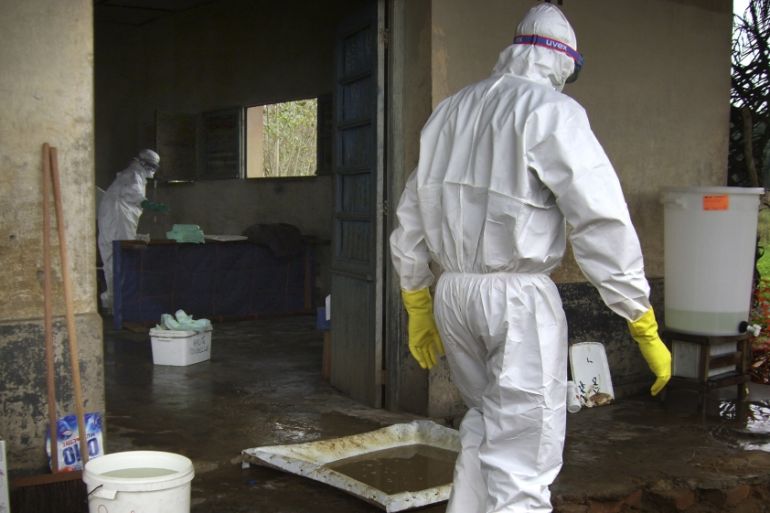DR Congo declares Ebola epidemic over
Announcement comes at the end of a 10-week observation period for re-emergence of the disease which claimed 33 lives.

The Democratic Republic of Congo (DRC) has officially declared the end of an outbreak of Ebola, bringing the curtain down on a 10-week re-emergence of the disease which claimed 33 lives.
Health Minister Oly Ilunga made the announcement in a statement on Tuesday following “an observation period of 42 days during which no new confirmed cases have been observed, and in conformity with international health regulations”.
Keep reading
list of 4 itemsUganda declares end of Ebola after 4-month outbreak
Uganda’s Ebola outbreak nearly under control, says Africa CDC
Ebola vaccines produced lasting antibodies during trial: Studies
The outbreak – the ninth in the DRC since 1976 – began in the remote northwestern area of Bikoro, where the first cases were recorded on May 8.
The news triggered a wave of international concern, which heightened after cases emerged in Mbandaka, a city and transport hub on the Congo River with a population of more than one million people.
“In total, after verification, the national coordinating committee recorded 54 cases (of Ebola), comprising 33 deaths and 21 survivors,” Ilunga’s statement said.
A previous toll, issued by the ministry on July 20, had said 29 people had died.
International groups will remain in the DRC for follow-up and monitoring, while the World Health Organization (WHO) congratulated the country.
“The outbreak was contained due to the tireless efforts of local teams, the support of partners, the generosity of donors and the effective leadership of the ministry of health,” said WHO Director-General Tedros Adhanom Ghebreyesus.
“That kind of leadership, allied with strong collaboration between partners, saves lives,” he added.
![The WHO provided clinical care, protective gear and emergency medical facilities to contain Ebola in the DRC [Reuters]](/wp-content/uploads/2018/05/020d60e83860469ebb1a5937c26743f1_18.jpeg)
International support
The same strain of the highly contagious disease killed more than 11,000 people in Guinea, Liberia and Sierra Leone between 2013 and 2015.
The WHO came under fire for bungling the response to that outbreak in West Africa, and vowed to overhaul its rapid-response effort.
Experts had called for urgent changes at the UN organisation after their investigations found that the agency’s intervention was inadequate.
A UN-appointed panel of independent experts said the WHO was too slow in declaring a global public health emergency by waiting until August 8, 2014, five months after the outbreak had taken hold.
It immediately rushed support to the DRC in the form of clinical care, protective gear and emergency medical facilities and mobilised $2m in fast-track financing.
It also provided a vaccine called rVSV-ZEBOV which had proved to be highly effective in trials during the West African pandemic, when it was tested as the outbreak was waning.
The vaccine has yet to be licensed and has to be kept at extremely cold temperatures, which adds to the challenge of distributing it in poor, hot countries.
However, data from the trials suggested it was safe as well as effective, and thousands of front-line health workers received the jab.
![The latest Ebola outbreak claimed 33 lives in the DRC [Reuters]](/wp-content/uploads/2018/05/4e17cbb6ad9d46a28593e3fde38df77a_18.jpeg)
Ebola is a virus-caused haemorrhagic fever that in extreme cases causes fatal bleeding from internal organs, the mouth, eyes or ears.
It has a natural reservoir in a species of tropical African fruit bats, from which it is believed to leap to humans who kill and butcher the animals for food.
Transmission among humans then typically spreads through close contact with the blood, body fluids, secretions or organs of someone who is sick with Ebola or has recently died.
The average fatality rate is around 50 percent, varying from 25 percent to 90 percent, according to the WHO.